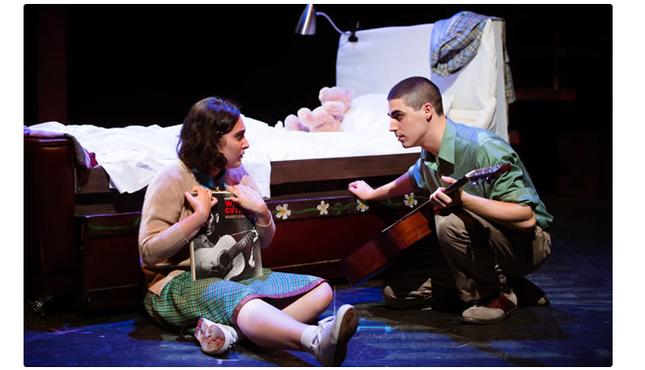‘Dogfight’: Boy, Girl Find Each Other in the ’60s
By • September 17, 2015 0 1490

If you’re a D.C. theater-goer, you’d be forgiven if you’ve gotten the impression that this has been the summer of Benj Pasek and Justin Paul in Washington.
The talented musical hotshots first surfaced at Arena Stage this summer with the world premiere of “Dear Evan Hansen,” a contemporary musical about the complicated life of an angst-driven teen trying to get the girl in the worst and best possible way. The show—which had, in addition to Pasek and Paul, a top-notch team with book author Steven Levenson , director Michael Greiff (“Next to Normal,” “If/Then” and “Grey Gardens”), and star Ben Platt (“Pitch Perfect,” “Ricki and the Flash”)—was a hit here, with pretty much unanimous critical and audience approval. As a results, its slated for an Off-Broadway debut at Second Stage.
Now we get “Dogfight,” an earlier Pasek and Paul effort which got critics going in New York but failed to be a popular hit. The folks at Keegan Theatre, now permanently settled in its renovated but still intimate Church Street space are staging what is just a challenging a show as “Hansen” with tight verve and imagination, given us another opportunity to take a good look at the work of the dynamic duo that appears to be (mostly successfully) trying to reshape the musical to reflect the times.
“Dogfight” is a different kettle of dramatic tea than the smoother “Hansen”—if it’s not easy to create a musical around the subject of teen suicide and bullying as “Hansen” was, it’s even harder to make a sustainable show which features as its plot-driver the nauseous idea of too-young-soldiers about to be shipped out to Vietnam holding an ugliest date contest.
But you can now see a little more clearly certain ticks and gifts shared by Pasek and Paul in these two shows. They’ve created music which is as close to a reflection of contemporary pop music as may be possible. It’s not necessarily new, but it’s narrative-driven, serving the needs of a difficult plot in both cases. They also appear to have their finger on the pulse that might bring in that elusive blockbuster audience of millennials—the two composer-authors (both 30), seem to be in sync with their young characters.
“Hansen” was very much a part of these our times—“Dogfight” is set in 1963, the beginning years of blood-letting in Vietnam as a group of young, teenaged marines set out on a last night out in San Francisco (which everyone refers to as “Frisco,” a sure sign you’re not a native to locals). Three of the leading jarheads call themselves the “bees,” as in Birdlace, Boland and Bernstein. They’re an exuberant trio, accompanied by high-energy pals looking for girls and sex, about which they appear to know little, the 1960s apparently not yet in full flower-power bloom.
The very thought of the dogfight—apparently some sort of tradition with the trio—can fill an audience with dread. It’s one of those horrible by-products of buddy outings fueled by beer and testosterone which is predictably a painful disaster, especially for the women who are tagged for participation.
Birdlace, the nominal “hero” of the trio, charismatically played by Franco D’Affuso with lean, strutting and awkward intensity, picks out Rose, a shy, warm young waitress with folk-singing aspirations (these were the days of Dylan, Woody Guthrie and Joan Baez at brash, youthful zenith) and with no fashion style, a dark-haired, inexperienced girl whose physical charms remain purposefully hidden. But, with actress-singer Isabelle Smelkinson (who’s still a student at American University) inhabiting her, she manages to shine like a San Francisco Bay lighthouse. It’s such an appealing and authentic performance of intelligent, if clumsy, innocence that she makes every scene she’s in seem as real as today.
Birdlace and Rose (could be a singing duo) meet cute with an argument over Woody Guthrie until the whole scheme breaks open at a ratty club with a dance contest hosted by Chad Wheeler as a lounge singer straight out of an SNL routine by Bill Murray.
If the proceedings in “Dogfight” move along less smoothly—there’s an ugly, near rape of a prostitute in the first, and the Vietnam war setting seems to have been derived more from movies and plays (think “Streamers, The Musical!”) than the real thing—the show, especially as pulled off by the Keegan group under the youthful co-direction of Christina A. Coakley and Michael Innocenti, has more than a few moments.
What might have been an unsettling piece of theater somehow finds its sea legs, spurred on by some terrific songs—“Nothing Short of Wonderful,” “It’s a Dogfight,” the aggressively cynical “Hometown Hero’s Ticker-Tape Parade” and brassy plot-driven songs and sweet ballads alike.
Posek and Paul, you realize, are looking to do right by the American musical by re-imagining its sound and tone, but also by creating characters that, after horrible moral mis-steps are looking to do the right thing. In the end, “Dogfight” isn’t about a creepy plot ploy, or even Vietnam. It’s about a boy and a girl finding each other, and finding each other comely and simpatico in the best way, losing each other and trying to find each other again. That’s not so bad a thing, especially when you have Smelkinson playing Rose. She’s a winner.

